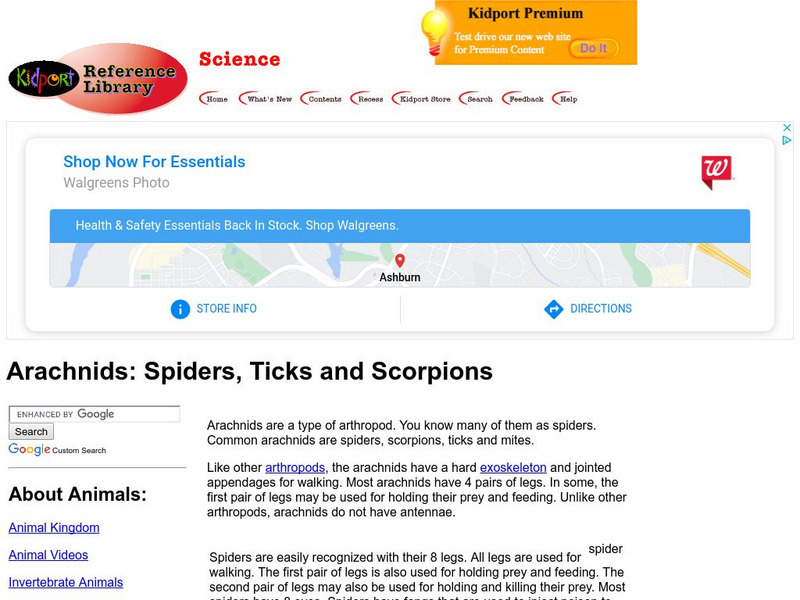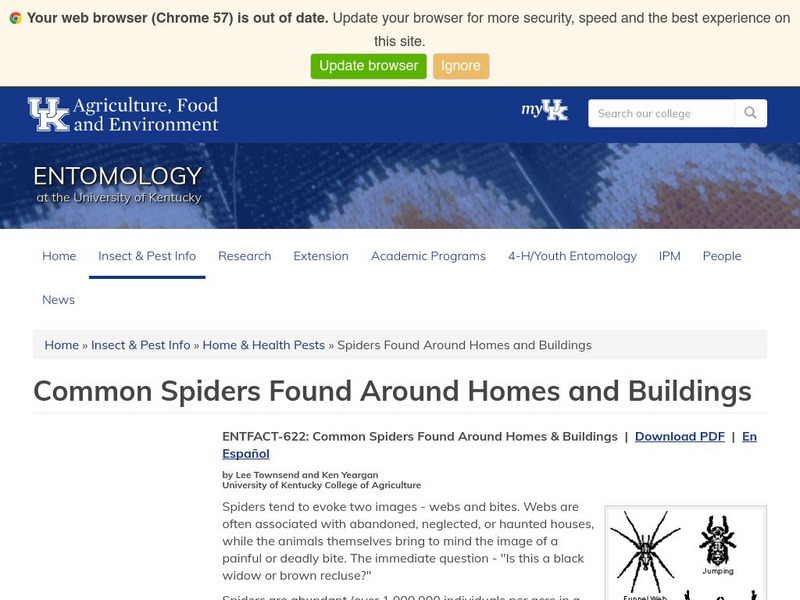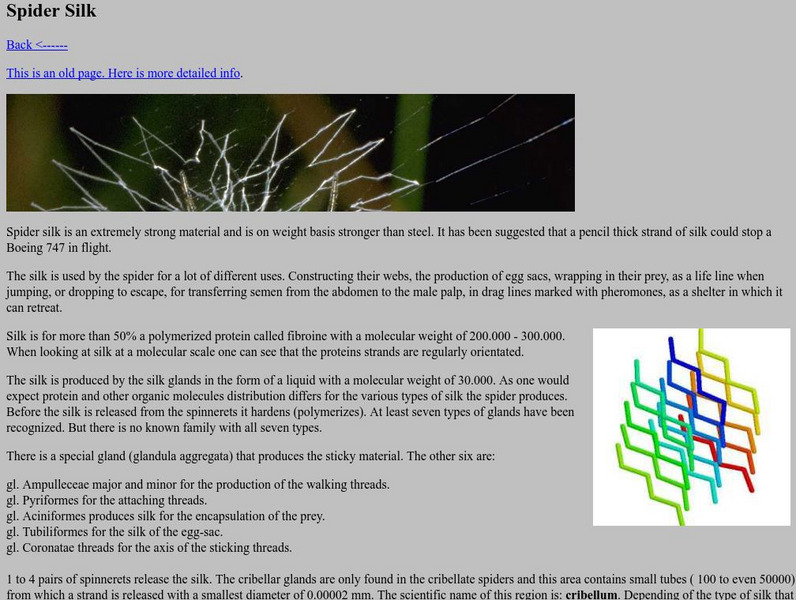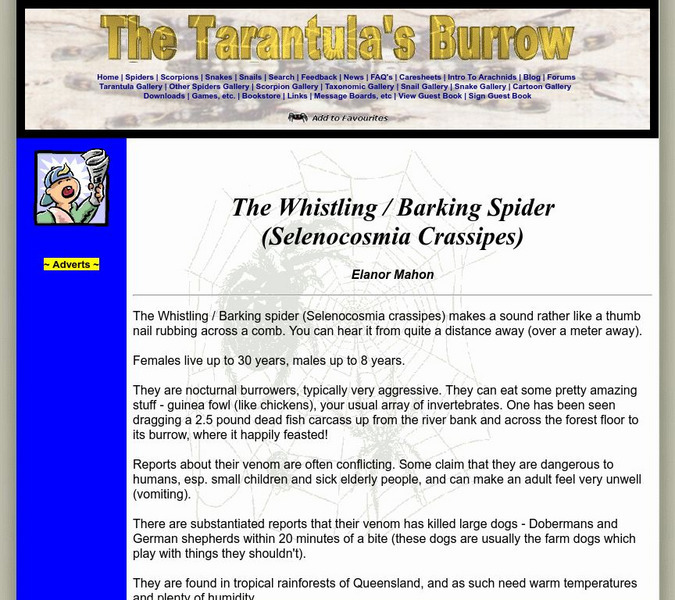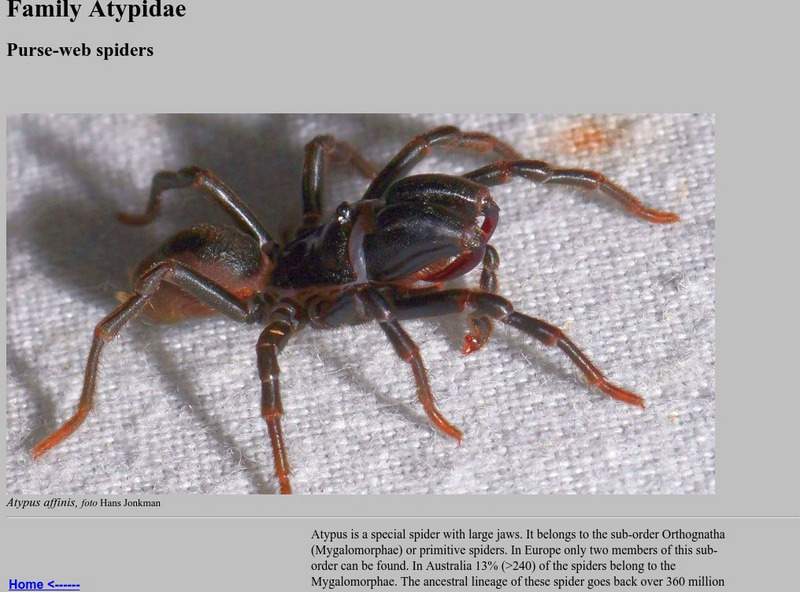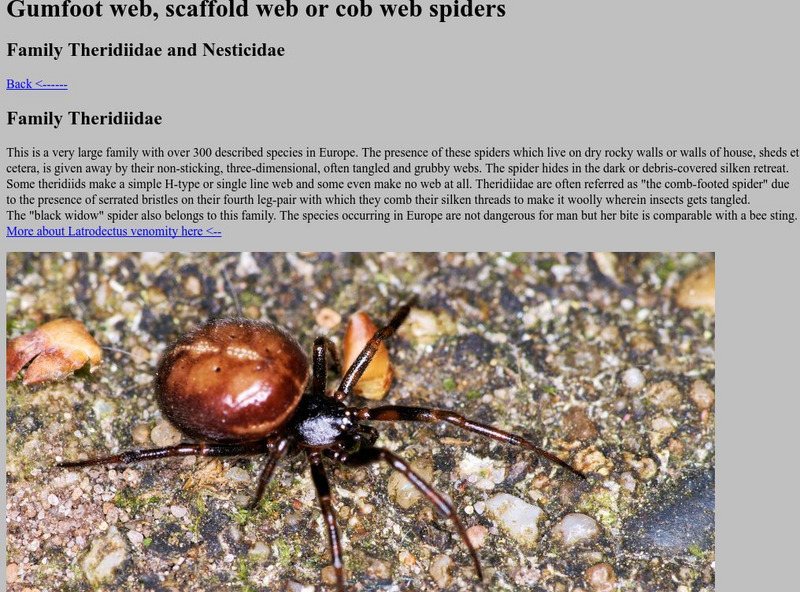Hi, what do you want to do?
McGraw Hill
Arthropods
Are spiders related to crabs? Study the order of arthropods with a reading selection about animal diversity. It provides details about each class within the order, as well as vivid pictures and explanatory charts.
University of Michigan
University of Michigan Critter Catalog: Arachnids
This informative site provides a general description of arachnids and then focuses on arachnids native to southeastern Michigan. Pictures and classification groupings are included.
Other
Crab Spiders: Family Thomisidae
This resource contains information on the Thomisidae family and offers plenty of pictures. Includes a section on the mating habits of the Genus Xysticus.
San Diego Zoo Global
San Diego Zoo: Kids: Spider
Colorful resource for learning useful facts about spiders with photographs as well as information regarding their physical characteristics and unique features.
Other
San Francisco Zoo: Black Widow Spider
Detailed information and fascinating facts about the black widow spider include diet, habitat, physical features, behavior, and conservation status.
Kidport
Kid Port: Arachnids Spiders, Ticks, and Scorpions
KidPort.com provides simple information on arachnids, a type of arthropod that includes spiders, ticks, and scorpions.
PBS
Pbs Nature: Spider
There are about 35,000 known species of spiders in the world and this research resource site surveys these animals in text and images.
Library of Congress
Loc: Everyday Mysteries: Spiders and Their Webs
Have you ever wondered how spiders avoid getting stuck in their own webs? Check out this excellent explanation.
BiologyWise
Biology Wise: A Detailed Description of the Anatomy of Spiders
Describes anatomical features of a spider, including its external structure, eyes, mouth parts, digestive system, circulatory system, respiratory system, nervous system, reproductive system, and its spinnerets.
Other
Tarantula's Burrow: British Spiders What Is a Spider?
A list of characteristics that a creature must satisfy to be considered a spider, as well as a list with pictures and descriptions of spiders commonly found in the UK.
University of Kentucky
University of Kentucky: Common Spiders
Find concise information that chronicles common spiders found around homes and buildings. Several descriptions and pictures are included on this site.
BBC
Bbc Nature: Camel Spiders
Camel spiders have a nightmarish reputation. Urban legends, fueled by the appearance of their extra large, powerful mouthparts, their voracious appetite, and their tremendous speed, surround these hairy arachnids. Learn more about camel...
University of Kentucky
University of Kentucky: Brown Recluse Spider
Webpage reference on the brown recluse spider which is more poisonous than a black widow and is more often found infesting homes and businesses.
Other
Ed Nieuwenhuys' Spiders & Immunology: Spider Silk
An informative site on the properties of spider silk, including its surprising strength and how it's produced.
Other
Araneae, Spiders of Europe: Family Amaurobiidae
Multiple colorful pictures bring this web site to life. Contains information on the mating and preying habits of the amaurobiidae, otherwise known as the tunnel weavers.
Other
The Tarantula's Burrow: The Whistling / Barking Spider
A quick overview on the whistling spider which is found predominantly in Australia. Includes reports on their ability to make noise and the effects of their bites.
Sheppard Software
Sheppard Software: Daddy Long Legs
Find out the difference between harvestmen and spiders in the arachnid family. Read about the diet, characteristics, and status as an endangered species.
Burke Museum
Burke Museum: Arachnology
Arachnology, or the study of spiders and other Arachnida, is discussed here in the research and collection section of the Burke Museum. Other topics discussed include spider myths, research, and people.
Other
Araneae, Spiders of North West Europe: Purse Web Spiders
A detailed description of the primitive purse-web spider. Includes pictures and information on how it catches its prey
Other
Araneae, Spiders of North West Europe: The Black Widow
This site contains information on the black widow's family. Includes information and pictures on the entire family, not just the black widow.
Other
Tb: Spiders Considered as Medically Important
This article investigates how humans vary in their vulnerability to venomous spiders and the importance of certain spiders to medical research. It investigates what factors contribute to this difference.
Oakland Zoo
Oakland Zoo: Brazilian Black Tarantula
Meet the Brazilian black tarantula and discover fascinating facts and statistics. Learn about its physical characteristics, habitat, diet, behavior, breeding patterns, and more.
Curated OER
Kids Health: Hey! A Black Widow Spider Bit Me
This site is provided for by KidsHealth. Black widow spiders are poisonous spiders. Use this site to find out how to identify them, where they live, and what to do if you are bitten by one.
National Health Museum
Access Excellence: Terrific Tarantulas
A detailed site about tarantulas, including topics suchs as molting, structure, urticating hairs, and how to handle them.









